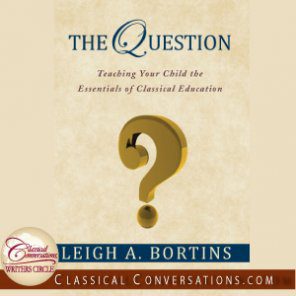What is the purpose of a question? Is it to come up with a correct answer or should there be something more?
What if we used questions to stimulate more questions? What if our purpose for asking questions was to extend the curiosity of our students rather than just achieving a correct answer?
(And what if I approached our Essentials and IEW assignments in this way every day?)
In The Question, Leigh Bortins challenges us to consider the question as a tool to focus on and master difficult tasks when we approach the logic stage with our children. She takes us through the art of asking powerful and meaningful questions, starting with a discussion of why we need classical education and how the dialectic stage teaches families to wrestle through reasoning. Drawing upon her experience and wisdom, she then turns to the dialectical arts and provides specific examples on how to approach reading, writing, math, geography and current events, logic, history, science, and fine arts at the dialectic stage. The conclusion of the book contains model questions to encourage dialectic discussion, along with a list of resources for each subject.
Within the pages of this book, Leigh teaches us how to ask specific questions of definition, comparison, relationship, circumstance and testimony for each of the subjects. As my thoughts were saturated with how to ask powerful questions that actually help us to process difficult tasks, I realized that many of the questions I currently ask are limited. I admit that most of my questions are not to challenge a student to wrestle with an idea. My (unintended) goal has been to rush through and finish this question so that we can rush through and finish the next question. The end result is the answer, not the discussion. And yet, I enjoy those moments when my logic-stage son asks a question that challenges us to think harder through something together; I treasure the time we spend in the dialogue that comes as a result. I desperately want my children to have inquisitive spirits and to use that to train them to become analytical thinkers!
“That is the joy of the dialectic stage, in which your child’s natural argumentativeness opens the door for the kind of adult conversations that truly matter.” – Leigh Bortins, The Question, page 89
In an effort to approach math from the perspective of promoting dialectic discussion, I intentionally asked questions of definition, comparison, and relationship as my oldest son struggled through some problems. The following photos depict what it looked like to have him reason through the questions I was asking (many of which were specific questions within The Question). As I asked questions, he asked even more questions. It was contagious and enthralling!




To solve a math problem and also come up with a much deeper understanding was a thrill for him. During those moments we were a team struggling through mathematical ideas together. He (and I) absolutely loved it! Truly, I want to see these revelations each and every day! After reading The Question, I feel equipped to train myself to ask quality questions.
There is so much more I could say and quote, but here are ten takeaways from reading this book (aside from the many examples of how to ask questions that promote dialectic discussion):
1. Share ah-ha moments with my children in whatever I am doing. “Look for the grammar, dialectic, and rhetoric as you go about your day…” page 14.
2. Remember that questions are more important than answers; the journey of discovery is more important than the discovery itself.
3. Brainstorm with my child on the whiteboard when completing Essentials/ IEW (or other) writing assignments. {And use the “Who-What-How-What” method.}
4. Ask questions of my child instead of correcting or marking his paper. Let him find his own mistakes by asking good, open-ended questions (e.g., ask them how to build bridges from one thought to another).
5. Experts and professionals are paid to do their jobs well, but I can find joy in being an amateur. {Praise the Lord for that! … because I am an amateur blogger and an amateur classical educator, and I can just enjoy it despite because of my lack.}
6. Learn to be active readers. Model for and teach them to read with a pencil in hand. {While I read with a pencil in hand, they do not—yet.}
7. Ask good questions through games. {Games work for all three stages of the trivium!}
8. Model an interest in writing by journaling or admiring the written work of others.
9. Tension is –okay—take a walk to work through the tension of a question together.
10. Do not allow a fear of failure to hinder my questions. It is okay to be incorrect. The goal of education is to give us a voice.
“I am okay with incorrect answers; I have an eternity in which to correct my misconceptions, but my soul will wither if I have no questions.” -Leigh Bortins, The Question, page 37
Just as I have used The Core as a reference guide for the Foundations stage, The Question will be my reference guide for many years to come as I trod with my children through a challenging yet worthwhile study of the core subjects. And it will continue to be my inspiration for learning how to ask meaningful questions as I attempt to train my children in this lost tool of learning./p>
I highly recommend The Question to all parents who are wondering what we will eventually do with all of this grammar-stage memorizing, and especially for Essentials (grades four and up) parents and beyond. It has equipped me to tackle the preteen and early teen years with confidence and enthusiasm!




